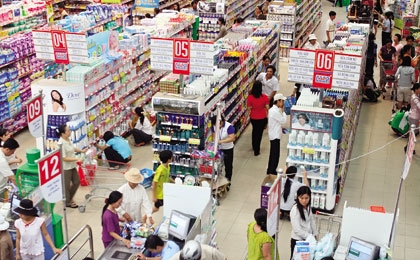Credit kept tightened amid price concerns
 |
| The market sees new pricing level established |
Ho Chi Minh City and Hanoi’s consumer price index (CPI) in April went up by 3.16 and 3.28 per cent month-on-month respectively.
Hoang Van Toan, TrustBank’s board of directors chairman, said it would take longer than expected to bring inflation under control and interest rates would remain high.
Nguyen Dai Lai, vice head of Credit Information Centre, said that the authority had no reason to pull down market interest rates.
“On the other side, the market itself pushes interest rate upward on the back of scarce funds. The interbank market is demonstrating this trend,” said Lai.
By end of last week, via interbank market, where local lenders borrow each other short-term funds, one to four-week loans were offered at over 20 per cent, per year.
Earlier this year, the State Bank set credit growth under 20 per cent for 2011. However, Viet Capital Securities Company research director Marc Djandji said dong interest rates were high and the authority remained concerned at a possible acceleration in credit growth surpassing 20 per cent.
“Looking back at 2010, we saw a 30 per cent credit growth despite average common lending rates ranging between 18-21 per cent, per year suggesting prohibitive rates had done little to curb credit growth,” said Djandji.
“This year administrative policies and stricter enforcement may help keep credit growth under control to stabilise the economy,” he added.
At the moment, the lending rate stands at 18-25 per cent, per year.
According to the Hanoi and Ho Chi Minh City Statistic Departments, prices in both cities were driven by transportation, housing and construction materials, foodstuffs and household appliances. Of which, the transportation charges grew at the highest pace due to large adjustments in petrol prices in late March.
In fact, after raising electricity prices by 15 per cent and fuel prices by up to 24 per cent in March, policy-makers announced another round of double-digit upward adjustments to fuel prices in early April with petrol prices up by 10.36 per cent, diesel by 15.3 per cent and retail fuel oil by 13.5 per cent.
Vietnam’s spiraling inflation was caused by cost-push factors including lifts in price controls, higher commodity prices, cattle diseases and cold weather in the north in March.
“On the other hand, we believe inflation also continued to be affected by loosening monetary policy and fiscal expansion conducted in the past several years,” added Djandji.
Recently, the government signed a decision to adjust electricity prices under market mechanism, effective from June 1.
“The indirect impact of a possibly coming electricity price hike on the CPI would be potentially larger as electricity is an input cost in many goods and services,” Djandji said.
“We estimate that the government will adjust electricity price to end the use of stabilisation funds to subsidise electricity prices,” he said.
What the stars mean:
★ Poor ★ ★ Promising ★★★ Good ★★★★ Very good ★★★★★ Exceptional
 Tag:
Tag:
Related Contents
Latest News
More News
- Foreign leaders extend congratulations to Party General Secretary To Lam (January 25, 2026 | 10:01)
- 14th National Party Congress wraps up with success (January 25, 2026 | 09:49)
- Congratulations from VFF Central Committee's int’l partners to 14th National Party Congress (January 25, 2026 | 09:46)
- 14th Party Central Committee unanimously elects To Lam as General Secretary (January 23, 2026 | 16:22)
- Worldwide congratulations underscore confidence in Vietnam’s 14th Party Congress (January 23, 2026 | 09:02)
- Political parties, organisations, int’l friends send congratulations to 14th National Party Congress (January 22, 2026 | 09:33)
- Press release on second working day of 14th National Party Congress (January 22, 2026 | 09:19)
- 14th National Party Congress: Japanese media highlight Vietnam’s growth targets (January 21, 2026 | 09:46)
- 14th National Party Congress: Driving force for Vietnam to continue renewal, innovation, breakthroughs (January 21, 2026 | 09:42)
- Vietnam remains spiritual support for progressive forces: Colombian party leader (January 21, 2026 | 08:00)






















 Mobile Version
Mobile Version